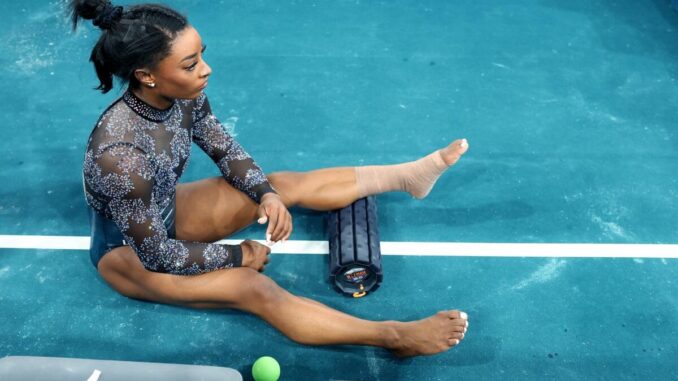
The latest instance of his discussion of “Black jobs” was at the National Association of Black Journalists conference, where he appeared as a speaker. He spoke at a panel on July 31 moderated by ABC News Senior Congressional Correspondent Rachel Scott, Fox News Anchor Harris Faulkner and Semafor Political Reporter Kadia Goba.
On the panel, Trump stated that he wanted “to stop people from invading our country” who are “taking Black jobs” and “Hispanic jobs.”Following her gold medal grab at the Paris Olympics on Thursday, Team USA gymnast Simone Biles took to X to celebrate, writing: “I love my black job ”
Biles’ post was seemingly a jab at former president Donald Trump, who has elicited criticism and spawned online memes for stating, without any concrete evidence, that immigrants coming to the United States illegally are “taking Black jobs” at the June 27 presidential debate. Biles became the most decorated women’s gymnast in United States history with her ninth Olympic medal. The three-time Olympian has taken home her sixth gold medal, this time in individual all-around. Biles is the first woman to win two Olympic all-around titles since Czechoslovakia’s Vera Caslavska in 1964 and 1968.
Simone Biles, the world-renowned gymnast and Olympic champion, has once again captured global attention—not just for her record-breaking performance but for her unapologetic celebration after her Olympic victory. With her powerful words, “I love my Black job,” she reminded the world of her resilience, her pride, and her unmatched role in changing the face of gymnastics forever. In this article, we’ll break down the moment, explore its cultural significance, and reveal why Simone’s statement continues to spark conversations worldwide.
Who Is Simone Biles?
Before diving into the iconic moment, let’s rewind a little. Simone Biles isn’t just a gymnast—she’s the gymnast. With a staggering number of medals, she has set the standard for excellence in the sport. She’s been called the “GOAT” (Greatest of All Time) and has pushed the boundaries of what’s possible in gymnastics with moves so difficult that judges had to rethink scoring systems.
The Victory That Made History
At the latest Olympic Games, Simone once again stood at the top of the podium. Her victory wasn’t just about medals—it was about reclaiming her place after years of challenges, from mental health struggles to intense media pressure. This triumph wasn’t just a win—it was redemption.
“I Love My Black Job” – What She Meant
When Simone said, “I love my Black job,” it wasn’t just a celebration. It was a statement of identity, empowerment, and pride. She used her platform to remind the world that her success is not separate from her heritage—it’s deeply rooted in it.
The Power of Representation
Representation matters, and Simone Biles knows it. For decades, gymnastics was often dominated by a narrow standard of who “belonged” in the sport. Simone shattered that mold. By excelling as a Black woman, she has opened doors for countless young athletes who now see themselves reflected on the world stage.
Why the Phrase Went Viral
Her words exploded across social media for a reason. They were bold, authentic, and unapologetically hers. People shared them not just because of who said them, but because of what they meant—a celebration of Black excellence and individuality in spaces where it’s often overlooked.
A Celebration Beyond the Arena
Simone’s victory wasn’t just about the gymnastics floor—it extended far beyond. Fans, celebrities, and fellow athletes flooded the internet with praise, calling her a trailblazer and a role model. Her celebration became a cultural moment, a rallying cry for empowerment.
Simone Biles and Mental Health
This victory also had a deeper layer. Remember, Simone has been open about her struggles with mental health, even pulling out of previous competitions to prioritize her well-being. Her triumphant return to the Olympic stage wasn’t just physical—it was emotional. She showed the world that strength isn’t just about muscles, it’s about courage and self-care.
Breaking Barriers in Gymnastics
Historically, gymnastics hasn’t always been inclusive. From judging biases to lack of representation, Black athletes often faced obstacles. Simone’s dominance proves that talent transcends boundaries, and her voice reinforces the importance of equity in sports.
Media Reactions to Simone’s Words
Mainstream media quickly picked up on her celebration. Headlines highlighted her authenticity, while opinion pieces dissected the cultural and social significance of her words. Some critics tried to downplay her statement, but the overwhelming reaction was one of admiration.
Social Media Explodes With Support
Twitter, Instagram, and TikTok lit up within minutes of her declaration. Hashtags trended worldwide, with fans posting messages of love, solidarity, and pride. Memes, quotes, and videos spread like wildfire, proving just how powerful words can be when spoken at the right moment.
The Legacy of Simone Biles
Simone’s legacy goes beyond medals. Her words are now part of that legacy. By embracing her identity, she’s ensuring that future generations know they don’t need to shrink themselves to fit into someone else’s mold.

Simone Biles as a Role Model
For young athletes, Simone isn’t just someone to admire—she’s someone to follow. Her honesty, resilience, and pride in her heritage make her a role model not only in gymnastics but in life.
How Brands and Sponsors Responded
Brands associated with Simone celebrated her win and echoed her message. Her words aligned perfectly with movements calling for diversity, inclusion, and representation in global sports.
Why This Moment Matters in Sports History
Not all victories are remembered equally. Simone’s words ensure that this moment won’t just be about another gold medal—it will be remembered as a cultural turning point.
Conclusion
Simone Biles didn’t just celebrate an Olympic victory—she celebrated her identity, her journey, and her resilience. Her statement, “I love my Black job,” wasn’t just about pride; it was a declaration that will echo for years to come. She continues to prove that true greatness is about more than medals—it’s about leaving a legacy that inspires generations.